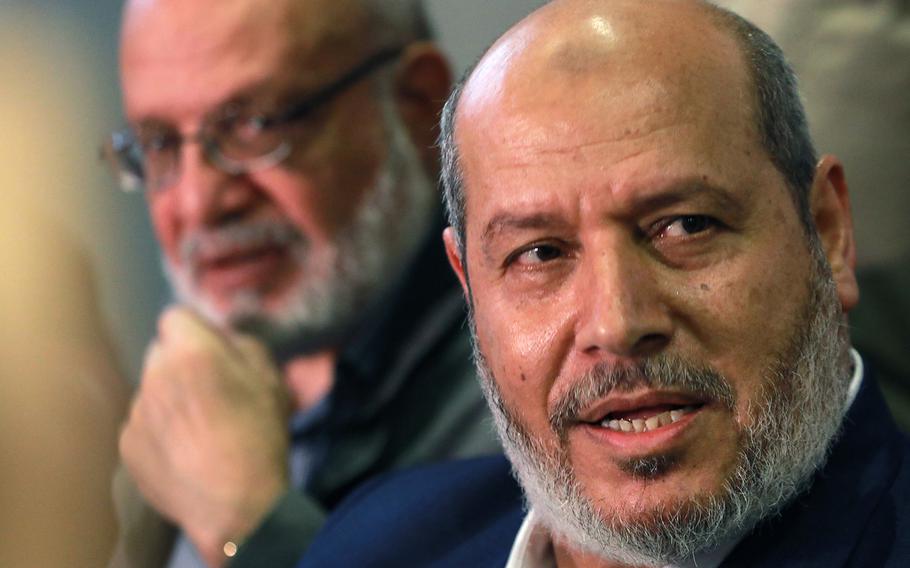
Senior official of the Palestinian Islamic Jihad movement, Abdulaziz al-Minawi, and Hamas Arab relations chief Khalil al-Hayya (right) hold a press conference during a visit to the Syrian capital Damascus on Oct. 19, 2022, for the first time since the Palestinian Islamist group severed ties with Syria a decade ago. Hamas was one of Assad’s closest allies, but left Syria in 2012 after condemning his government’s brutal suppression of peaceful protests in March 2011. (Louai Beshara/AFP via Getty Images/TNS)
(Tribune News Service) — Hamas is likely to name Qatar-based Khalil al-Hayya as a successor to slain leader Yayha Sinwar, aligning it closer to Iran and giving its main backer more sway in the next stage of the group’s war with Israel.
Al-Hayya is a protégé of Ismail Haniyeh, Sinwar’s predecessor who was believed to have been assassinated by Israel in Tehran in July. He has been leading indirect negotiations with Israel over both a cease-fire in Gaza and the release of hostages kidnapped by Hamas during the Oct. 7 attacks last year, which triggered the ongoing conflict.
“The next leader will almost certainly come from the movement’s leadership in Doha,” wrote Ghaith al-Omari and Neomi Neumann, senior fellow and visiting fellow respectively at the Washington Institute for Near East Policy. Al-Hayya would “likely seek to continue Sinwar’s path both in the Gaza war front and in staying close to Iran,” they said.
Al-Hayya gave a televised speech on Friday, suggesting he is assuming the leadership role, at least on an acting basis. He vowed to use Israel’s killing of Sinwar this week as motivation to continue fighting, saying the hostages “will not return to you unless the aggression on Gaza stops.” Israel must withdraw from Gaza and Palestinian prisoners in Israeli jails should be released, he said.
“We will keep our oath to you Abu Ibrahim and your banner won’t fall,” said Al-Hayya, referring to Sinwar as he was widely known.
Although Al-Hayya is seen as more of a political leader, he’s still regarded as part of the same Gaza-based military team that works closely with Iran and masterminded and executed the Oct. 7 attacks.
“Those leading the battle are members of this wing that’s close to Iran and liaises directly with it,” said Hassan Abu Haniyeh, an expert and commentator on militant Islam based in Jordan. He said Hamas may choose not to immediately nominate Al-Hayya as the official successor so as not to put a target on his back right away.
Hamas has been fighting Israel in Gaza since its Oct. 7 attacks on the south of the country, which killed about 1,200 people. Israel’s subsequent campaign has killed more than 42,000, according to the Hamas-run health ministry in Gaza, and devastated the Palestinian territory.
The war has spread more recently to Lebanon, where Israel has launched an offensive against Hezbollah, another Iran-backed group, after a year of trading rocket fire across the border. Both Hamas and Hezbollah are considered terrorist organizations by the U.S. and others.
Iran leverage
Al-Hayya’s elevation to the leadership post could be leveraged by Iran to its advantage, particularly after both Hamas and Hezbollah — key components of Tehran’s so-called axis of resistance — have been dealt crushing blows by Israel, according to Jane Kinninmont, director of policy and impact at the European Leadership Network.
Israel killed Hezbollah’s long-standing leader, Hassan Nasrallah, in Beirut last month, alongside many other senior members.
“I think generally Iran’s position is weakening but Iran will be looking for cards to play so presumably they would like to be able to influence any hostage negotiation,” she said. “There are so many attempts to spin what’s happening.”
U.S. President Joe Biden and Western allies are attempting to cast Sinwar’s death as the end of the war in Gaza, but Israeli Prime Minister Benjamin Netanyahu has promised to fight on. Israel has long vowed to completely dismantle Hamas and rescue all remaining hostages, of which about 100 are believed to still be alive and in captivity.
“The mission before us is yet to be completed,” Netanyahu said on Thursday night.
While Sinwar’s killing in southern Gaza this week is undoubtedly a major blow to Hamas, the movement will look to turn its former leader into an icon of resistance to bolster its recruitment and standing in the region, the Middle East experts said.
“He was a dead man walking and Hamas knew it and this moment was expected,” said Oraib al-Rantawi, director of the Amman-based Al-Quds Center for Political Studies, who met with Hamas leaders in Qatar days before Sinwar’s killing. “Of course there’s shock but Hamas knew that Sinwar topped Israel’s hit list.”
He added that Sinwar’s killing will likely serve as “inspiration for an entire generation.”
Al-Hayya’s Doha location will make him a harder target than Sinwar, according to Kinninmont. “It makes more sense to have someone outside,” she said. “I guess these days you can’t rule anything out but I don’t think Israel would assassinate a leader in Qatar.”
Sinwar’s death could see the elevation of two figures on the ground in Gaza: his brother and right-hand man Mohammed, and Izz al-Din Haddad, who is the military head for the territory’s northern section.
Supporters of Hamas, Iran and the axis of resistance are already turning Sinwar into a hero of the war against Israel given the manner in which he was killed. Sinwar lived and died in an “exceptional” manner, Dima Tahboub, a Jordanian member of parliament with the Hamas-allied Islamic Action Front party, posted on X.
He will continue to embody “an exceptional resistance movement until liberation,” she said.
With assistance from Julius Domoney.
©2024 Bloomberg L.P.
Visit bloomberg.com.
Distributed by Tribune Content Agency, LLC.